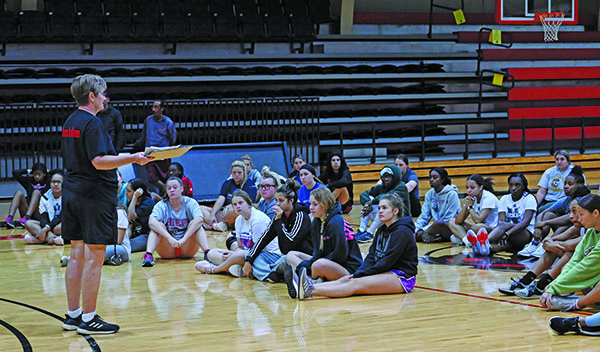Student athletes face additional mental health challenges
By DEVYN LANSDEN, Editorial Editor

Classes.
Grades.
Teachers.
Coaches.
Anxiety.
Stress.
These are some of the pressures traditional students and student athletes face, and they can take a toll on a person’s mental health.
Mental health is a topic that is becoming more mainstream rather than stigmatized, and students are learning about the importance of caring for their mental health.
Coaches say they understand the importance of mental health and encourage their players to use Northwestern’s counseling services if they need them.
Taylor Wilson, director of counseling and career services for the university, says she is someone in whom Northwestern students can confide.
Wilson said students are becoming more open to talking about their mental health and reaching out for help. In part, that’s because celebrities are talking about and sharing their stories.
Wilson said students’ anxiety can increase when they come to college because they are faced with new stresses, and they are transitioning to being on their own.
CORONAVIRUS PANDEMIC AFFECTS MENTAL HEALTH
The coronavirus pandemic has affected students’ mental health.
One Northwestern student who contracted the coronavirus and was put in quarantine in the dorms later went to her doctor for what she thought to be heart problems.
It turned out to be anxiety. The student, who asked to remain anonymous, was diagnosed with anxiety in December 2020.
Her symptoms included heart palpitations and low blood sugar.
According to the Cleveland Clinic, experiencing heart palpitations is normal when someone is anxious, and the condition can be easily mistaken as having heart problems.
People can have low blood sugar because they take short breaths when they feel anxious, causing blood vessels to widen and leading to a drop in blood pressure, according to Medical News Today.
The student said she thinks people need to recognize mental health as a normal topic to discuss.
“I think a lot of people see it as almost being weak, or it’s not a real issue and you just need to get over it,” she said.
MENTAL HEALTH AFFECTS PHYSICAL HEALTH
Dr. Jason Ferrell, chair of the Northwestern psychology department, said he covers all topics of mental health in his classes and teaches about every aspect of it. He said he discusses how students can get help with their mental health if needed.
“We dive into really trying to understand a holistic view of human behavior,” Ferrell said. “What is it that drives the way people think, the way people feel and the way people behave, both as individuals and as bigger groups of people.”
Ferrell said a large focus of the psychology program is training students to become effective counselors in practice. He said students have to become trained professionals in treating mental health.
For some students, Ferrell said, coming to college and changing their environment can increase anxiety levels. He said they could have doubts about fitting in. They are in a new place without their friends and family, and they might not feel smart enough to perform well in classes.
“It [college] is an unpredictable and uncertain environment when you come,” Ferrell said. “Humans, in general, don’t function well in unpredictable and uncertain environments.”
Ferrell said having some anxiety is normal and healthy because it makes people pay attention to what is going on around them. Some students’ living environments away from college might be more anxiety-prone, and coming to college will cause their anxiety to diminish.
Whenever students are in a place that is more predictable, their anxiety levels will go down, he said.
“We have students that come from very challenging and traumatic environments,” Ferrell said. “And when they come to Northwestern, it is for the first time in their life a safe place, a quiet place, and that causes their anxiety levels to go way down.”
STUDENT ATHLETES FACE PRESSURE
Students and student athletes are all faced with different challenges, Ferrell said. Student athletes are required to miss class for games. They have to catch up on assignments and might not get to interact with their teachers as much as other students.
“It requires them [student athletes] extra effort, extra load, extra planning to be just as successful as someone that can just come to class every day,” Ferrell said.
Northwestern football player Stephen McCluskey, who is from Scotland, is a graduate student at Northwestern and is a resident assistant in Ament Hall. He said he knows people who struggle with mental health, and he said he helps them in any way he can.
The last student he knew who was struggling was working to pay for school and was stressed about school work, McCluskey said.
“I helped them out with money, but once it got out of my hands, I called people for help,” McCluskey said.
In a meeting each year, Northwestern athletes discuss mental health and the support systems available to them.
McCluskey said the jump from high school to college is a big transition to get used to when playing a sport.
“People may tell you, ‘You were the best athlete in high school,’” McCluskey said. “But then you are just average in college. It hits you hard.”
Athletes have to practice, lift weights and go to meetings on top of going to classes and doing homework. McCluskey said this places a lot of pressure on athletes to keep up with their work. They must also maintain good grades because, if they don’t, they won’t be able to practice.
PREPARING FOR GAMES AND LIFE
McCluskey starts preparing for a game the night before game day. That night, he watches the movie “Brave Heart.” The next morning, he walks his dog and listens to calm music all day. About an hour before the game, he will listen to more up-beat music to get him energized.
On the day of the game, he’s constantly checking his plays, making sure he knows his job for the game, he said.
He prepares the same way for a test. He makes his own study guides and will continually look over them until he knows the answers, he said.
FINDING AN OUTLET
Getting involved on campus as a student athlete is important, McCluskey said. He said meeting new people can help him reduce stress.
Being involved on campus is something Jill Lancaster, Northwestern’s cross country and track coach, encourages her athletes to do.
“If they don’t have an outlet in the community, whether it be student government or the Spanish Club, I think there is a huge amount of burden and knowing where to turn,” Lancaster said. “You need that outlet. You need to develop as a person and know what you like and dislike.”
She said her athletes do not have much trouble balancing class, homework and their sports. She said both the men’s and women’s teams have high academics. As runners, they are high achievers, she said.
“In that sport, you’re used to doing a lot of work on your own, and you’re not depending on anyone else to help you compete, so you hold yourself to a pretty high standard,” Lancaster said.
The problem of burnout or feeling overworked can be solved quickly, Lancaster said, so she encourages her athletes to communicate with her. She said she strongly recommends they talk to Wilson, the university’s counselor, if the problem builds up over time. She said she is willing to give her athletes time off if they need it.
“Nothing is to be taken lightly,” Lancaster said.



